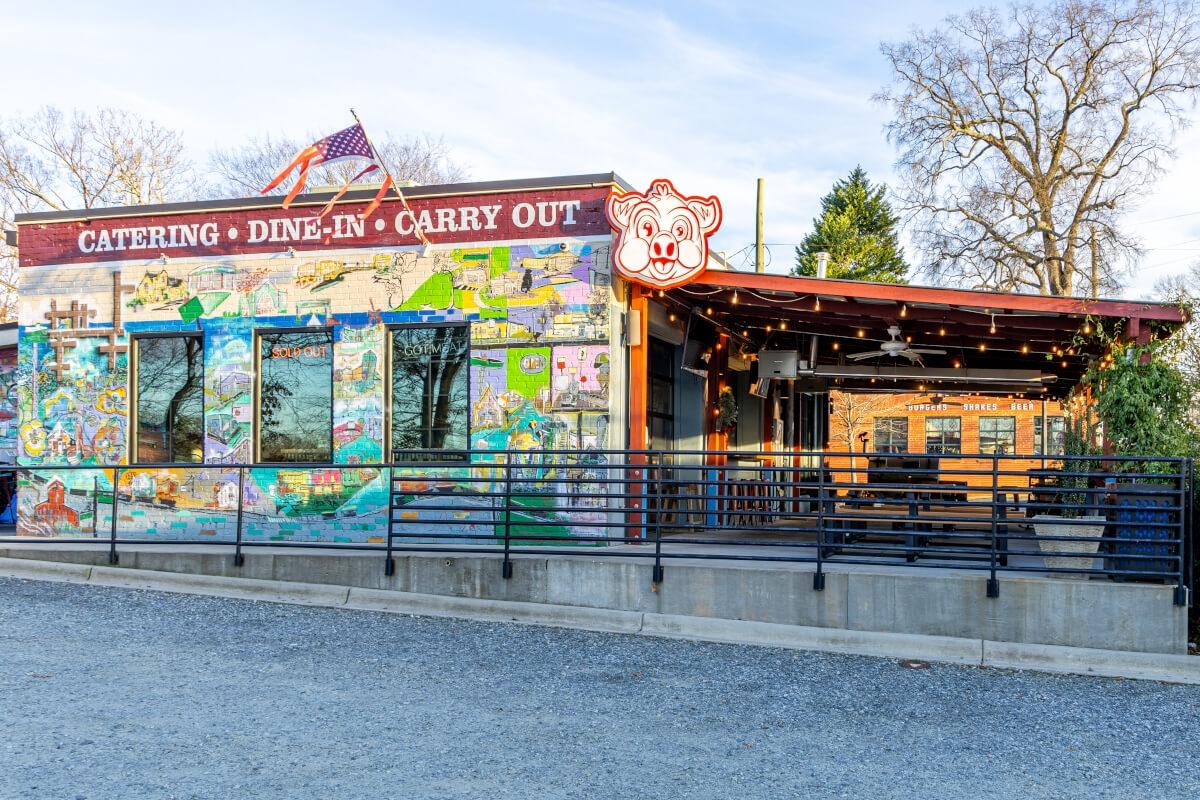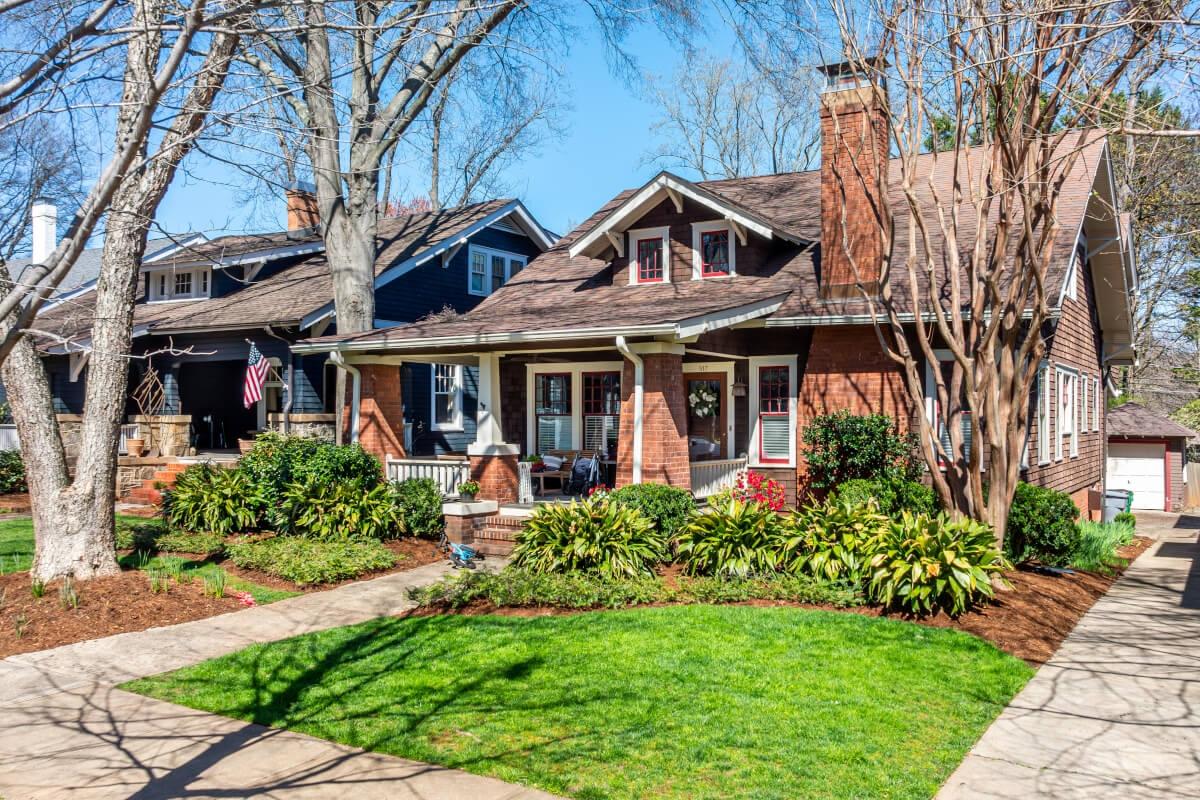What’s It Like to Live in Charlotte?
Named after Queen Charlotte of Mecklenburg-Strelitz and often called the Queen City, Charlotte, North Carolina, is an economic and cultural hub. This city is known for its passionate sports fans, trendy local breweries, and the NASCAR Hall of Fame. A good school district, active nightlife, and an ever-growing job market make Charlotte a city for everyone.
Facts to Know About Charlotte

Established in 1768, Charlotte is a fast-growing Southern city that offers trendiness alongside history.
- Population: Approximately 800,000 residents, according to the City of Charlotte.
- Special Landmarks: The Billy Graham Library, the Sculptures at Independence Square, St. Peter Catholic Church, Freedom Park.
- Historic Implications: Despite its namesake being British royalty, Charlotte played a pivotal role in boosting rebel morale during the American Revolution. The Battle of Charlotte in 1780, though a relatively small battle in the grand scope of the Revolution, marked a shift in the southern colonies’ resistance against Great Britain. Tradition says that British general Charles Cornwallis referred to Charlotte as “a hornet’s nest of rebellion” after this battle, and the city has taken on the hornet as its personal mascot.
- Universities: Of the 13 colleges in the Charlotte area, arguably the two most prominent are Davidson College and UNC Charlotte.
The Pros and Cons of Living in Charlotte, NC
Pro: Booming job market

Charlotte’s job market makes it an appealing place to live. The North Carolina Department of Commerce estimated an 11.3% employment opportunity growth between 2018 and 2028, with professional, scientific, and technical services being the fastest growing industries.
According to the U.S. Census, Charlotte’s unemployment rate in 2022 was 3.3%. This was roughly 23% lower than the national average of 4.3% the same year and a 34% decrease from Charlotte’s unemployment rate of 5.0% in 2021.
Con: Traffic
With any big city comes the headache of traffic. Residents on Niche.com complain about traffic and the lack of sufficient public transportation. One resident said, “Traffic transportation can be challenging at times, making it harder to get around efficiently.”
Charlotte’s booming job market seems to be a double-edged sword. One resident said, “It would be nice to see the traffic reduced, but as long as new buildings continue being built, that is not going to happen.”
Pro: Great food scene

Charlotte is a foodie’s dream. With your choice of Southern comfort food, international cuisines, and North Carolina’s signature barbecue, you can satisfy every craving. According to a resident, there are always new restaurants popping up: “The food is incredible! There’s always a new spot to try.”
Con: High cost of living
While the average rent in Charlotte is about 11% lower than the national average of $1,631, the cost of living in Charlotte is significantly higher than that of other cities in North Carolina. The costs of groceries, housing, and utilities in Charlotte are, on average, higher than the national average.
The high cost of living compared to the rest of North Carolina frustrates residents. One resident said, “The salary you can make is nice, but the cost of living eats it.”
Another resident complained about the lack of affordable housing: “The cost of living is higher than the take home income of most employed in the city. Affordable, safe, quality housing is lacking.”
Pro: Great neighborhoods

Charlotte's best neighborhoods are known for their well-manicured lawns and proximity to daily amenities. Places to live in Charlotte offer renters the excitement of city life while enjoying quiet Southern charm.
Three popular neighborhoods in Charlotte are:
- Dilworth: A historic neighborhood just minutes from museums, stadiums, and breweries.
- Ballantyne: A park-filled suburb on the South Carolina state line that is one of the best neighborhoods to rent a house.
- Governor’s Square: A quiet neighborhood surrounded by live music and top-notch dining.
Con: Lack of sports wins
Unfortunately for sports fans, Charlotte’s professional teams don’t have a great track record in recent years. The Carolina Panthers ended the 2023 regular season 2-15, placing last out of the 32 teams in the NFL. The Charlotte Hornets ended the 2023-24 NBA season 21-61, placing 13th out of 15 teams in the Eastern Conference.
Luckily, the University of North Carolina Tar Heels saved the day. The men’s basketball team ended the 2023-24 regular season 17-3, securing the top spot in the ACC regular season. The women’s basketball team ended the season 11-7, finishing ninth in the ACC.
Things to Do in Charlotte

In a city like Charlotte, there’s something for everyone. One resident said, “Charlotte ALWAYS has fun things to do such as painting, food, free events, and more.”
- Outdoor Activities: Freedom Park, Ballantyne’s Backyard, and Renaissance Park provide green space for leisure and outdoor activities.
- Cultural Attractions: For a taste of local culture, catch a basketball game at Spectrum Theater, go to one of Charlotte’s community events, or visit an art exhibit at the Mint Museum in Uptown Charlotte.
- Dining: Charlotte is full of trendy restaurants, and North Carolina barbeque is a focal point of the food scene. Craft beer is also a major industry in Charlotte.
Ready to make the move?
If Charlotte has caught your eye, take the next step with Apartments.com! Take a look at the most affordable places to live in Charlotte, or use our customizable filters to narrow your search by price, amenities, and floor plan.
Wherever you are and wherever you’re going, Apartments.com has the tools to help you find the perfect place.
This article was originally published on September 19, 2024, and has been updated to reflect December 2025 apartment rent and cost of living data.
FAQs
Is Charlotte a good place to live?
Charlotte is a good place to live for foodies who want to experience the trendiness of city life while enjoying Southern charm. Great schools in the Charlotte-Mecklenburg district and a growing job market round out life in Queen City. If you like barbecue, breweries, and seasonal festivals, Charlotte is the place for you.
What salary do you need to live in Charlotte?
According to our cost of living data, a comfortable salary for a single adult with no dependents to cover housing, utilities, groceries, and goods and services in Charlotte would be around $76,000 before tax.






